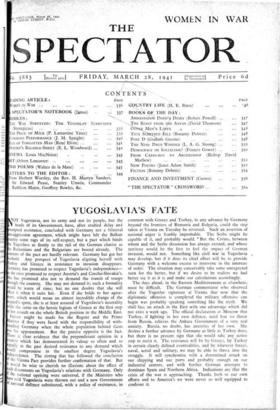YUGOSLAVIA'S FATE
OT Yugoslavia, not its army and not its people, but the heads of its Government, have, after studied delay and ttempted resistance, concluded with Germany not a bilateral n-aggression agreement, which might have left the Balkan untry some rags of its self-respect, but a pact which binds Yugoslays as firmly to the tail of the German chariot as e Rumanians and the Bulgarians are bound already. The ntents of the pact are hardly relevant. Germany has got her thold. Any prospect of Yugoslavia aligning herself with urkey and Greece in resistance to invasion disappears. ermany has promised to respect Yugoslavia's independence— she once promised to 'respect Austria's and Czecho-Slovakia's. he has promised also not to demand the transit of troops ugh the country. She may not demand it; such a formality ould be waste of time; but no one doubts that she will feet it when it suits her. Even if she holds to her agree- ent, which would mean an almost incredible change of the opard's spots, she is at least assured of Yugoslavia's neutrality Me she turns on the heroic legions of Greece as the first step her assault on the whole British position in the Middle East. Excuse might be made for the Regent and the Prime 'mister if they were faced with the responsibility of with- ding Germany when the whole population behind them for appeasement. But the precise opposite is the fact. ere is clear evidence that the Zpreponderant opinion in a linty which has demonstrated its valour so often and so IgnallY in the past desired resistance to any demand which ould compromise in the smallest degree Yugoslavia's dependence. The rioting that has followed the conclusion the Vienna Pact provides further confirmation of that. But t would be wise to cherish no illusions about the effect of Itch discontents on Yugoslavia's relations with Germany. Only the national uprising were universal, if the Ministers who e sold Yugoslavia were thrown out and a new Government national defence substituted, with' a policy of resistance, in common with Greece and Turkey, to any advance by Germany beyond the frontiers of Rumania and Bulgaria, could the step taken at Vienna on Tuesday be reversed. Such an assertion of national anger is frankly improbable. The Serbs might be capable of it, and probably would. But the Croats, between whom and the Serbs dissension has always existed, and whose territory would be the first to feel the impact of German invasion, would not. Something like civil war in Yugoslavia may develop, but if it does its chief effect will be to provide Germany with a welcome excuse to intervene in the interests of order. The situation may conceivably take some unexpected turn for the better, but if we desire to be realists we had better see it as it is and make our calculations accordingly.
The days ahead, in the Eastern Mediterranean as elsewhere, must be difficult. The German commentator who observed after the Yugoslav signature at Vienna that now that the diplomatic offensive is completed the military offensive can begin was probably speaking something like the truth. We shall face an attack in the East with one advantage which did not exist a week ago. The official declaration at Moscow that Turkey, if fighting in her own defence, need fear no threat from Russia, relieves the Ankara Government of a very real anxiety. Russia, no doubt, has anxieties of her own. She desires a further advance by Germany as little as Turkey 'does, but there is no present sign that she would take any active step to resist it. The resistance will be by Greece, by Turkey in certain clearly defined eventualities, and by whatever forces, naval, aerial and military, we may be able to throw into the struggle. It will synchronise with a determined attack on our shipping and our ports and probably enough on our industrial centres, and with further German attempts to dominate Spain and Northern Africa. Indications are that the crisis of the war is approaching. Thanks both to our own efforts and to America's we were never so well equipped to confront it.






























